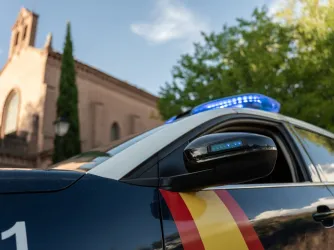Table of Contents
Tear down censorship, not posters
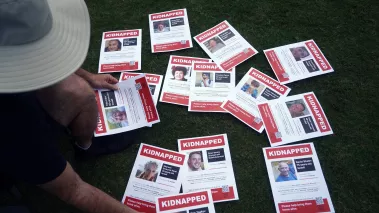
JENNIFER LETT / THE PALM BEACH POST / USA TODAY NETWORK
Shay Zaidenberg shows flyers of kidnapped Israelis on the Great Lawn in West Palm Beach, Florida.
Amid the ongoing conflict between Hamas and Israel, posters of Israelis taken hostage by Hamas are popping up on campuses across the United States — and some are being promptly torn down.
At the University of California, Santa Barbara and New York University, students were filmed tearing down posters featuring photographs of kidnapped Israeli citizens with the message, “Please help bring them home alive.” At the University of Pennsylvania, a library staffer tore down similar posters, telling the person recording the video, “Get the fuck out of my face.”
And at Columbia University, according to its student newspaper, an Israeli student in the School of General Studies was allegedly assaulted outside the school library by another student. According to reports from the accosted student and his friend, the assailant, a female student, approached a group of students as they were putting up flyers of Israeli hostages. Later, she hit the General Studies student with a stick when he saw her ripping those same flyers off the wall.
These incidents underscore the reality that U.S. campuses are feeling the rise in global tensions. Indeed, one of the NYU students who tore down the posters, and afterward expressed regret, said she did so out of a sense of frustration about distressing current events.
“I have felt more and more frustrated about the time we currently find ourselves in, and misplaced that anger into actions that are not an accurate representation of who I am as a person,” said the student in a since-deleted social media post, according to Fox News. A spokesperson for the student indicated that the student had been upset that the posters did not feature any Palestinian victims of the conflict.
While FIRE takes no stance on the Israeli-Palestinian conflict, we staunchly support free speech and oppose censorship in all its forms. In doing so, we oppose tearing down expressive materials and meeting speech with violence, no matter how upsetting public discourse or current events may be. Such tactics stifle debate and chill conversation, and they have no place anywhere in a free country, least of all on a college campus.
As we have said for years in response to similar instances of censorship, meeting speech with more speech is the only appropriate means of shaping public discourse surrounding the most consequential issues of our time. Students who wish to spread views contrary or complementary to what they see on campus bulletin boards may create and distribute their own materials or express themselves in a host of other ways, but they must not silence others. Not least of all, because free speech is the greatest bulwark we have against repression and violence.
In a piece on the importance of defending free speech as the Israeli-Palestinian conflict rages on, FIRE Director of Public Advocacy Aaron Terr put it this way: “It’s even more important to stick to free speech principles during times of crisis, when rising passions create a heightened risk of authoritarian overreach.”

As the Israeli-Palestinian conflict escalates, so must our commitment to free speech
FIRE has long defended the free speech rights of speakers on all sides of the Israeli-Palestinian conflict.
The latest flurry of poster teardowns shows that authoritarian impulses run not only through government entities and institutional leaders, but also through individuals inflamed by outrage, caught up in the whirlwind of current events and the media coverage surrounding them. And it’s happening at our most elite academic institutions, whose students should be leading the way in safeguarding — not tearing down — our most fundamental rights in difficult times.
If we hope to turn the page on this sad censorial chapter, institutional leaders and individuals must advocate unflinchingly for free expression, even — and especially — when confronted with views they find reprehensible. For leaders in higher education, this might mean disciplining those who violate others’ rights, educating the student body on the importance of the First Amendment. For individuals, it means maintaining a belief in a hopeful vision: a society in which conversation, not suppression or violence, is used to resolve conflict.
As each day brings with it new images of the devastation of war, it’s a vision we should all hope to see realized.
Recent Articles
Get the latest free speech news and analysis from FIRE.
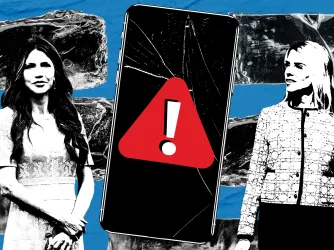
FIRE sues Bondi, Noem for censoring Facebook group and app reporting ICE activity
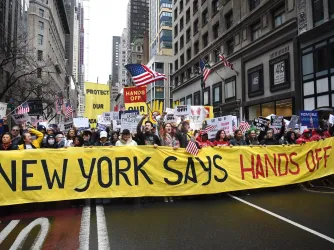
Deep dive into New York’s proposals to ban demonstrations near houses of worship
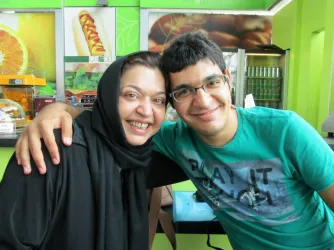
Iran replaced my mother’s voice with silence
